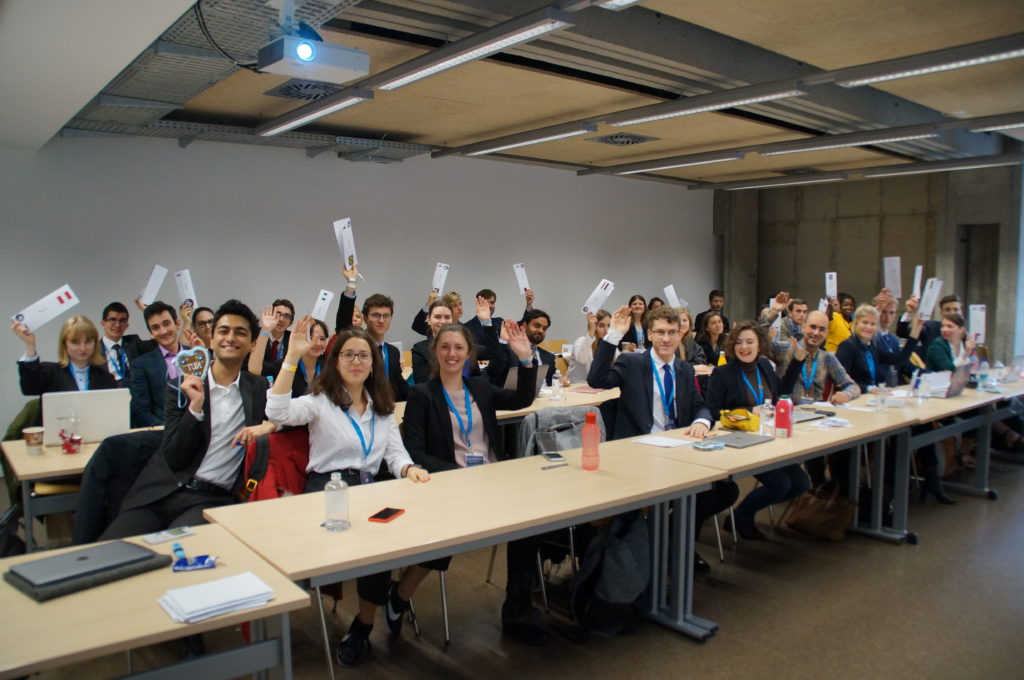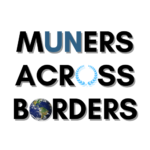What does “MUN” mean?
The term “MUN” stands for Model United Nations, academic simulations of the proceedings of the work of the UN committees and other multilateral bodies. Nowadays, MUN is a rapidly growing activity for young students, counting a multitude of conferences organized at the high school and university level by several MUN clubs, Youth Organizations, and leading MUN Associations around the world.
Who participates?
Hundreds of thousands of students worldwide participate every year in MUN at all educational levels – from primary school to university. The MUN participants are called “delegates”, youth that play the role of diplomats in a chosen UN organism: students can become world leaders for a few days! During a MUN, what distinguishes every delegate from others in the committee room is the “placard”, the signpost marked the name of the country whose they are the diplomatic representative.
What is the role of the delegates?
Delegates must represent the political position that the designated country takes in the organisms assigned – called “committee”- in relation to a defined agenda. The agenda consists of one to three relevant and current topics to be discussed with the purpose of developing solutions by drafting a resolution on behalf of the assigned country. The delegates’ job is to decide what the committee should do about these issues and convince the fellow delegates to approve the delegates’ “resolution” (the diplomatic document of solutions to the issue). The MUN simulation consists of negotiation, discussion, and lively debates, which is the cornerstone of UN activity.
Who is involved?
The organization behind a MUN involves many students, academics, and professionals, working and/or volunteering in the Organizing Committee and/or in the Secretariat Team of the respective MUN organization/association in a variety of capacities. The different Secretariat Team positions emulate the ones of the real United Nations, with a MUN Secretary-General and several Under-Secretary-General responsible for specific areas. Regarding the academic side of the conference, each committee is led by “Chairs” (also known as “Directors” or “Dais”), who help guide the committee through debate; while the other members of the staff -usually named “Rapporteurs”- help them in maintaining control and order on the committee. These staffs are there to help delegates not only during the formal sessions but also before and after the committee by answering delegates’ questions and doubts, ensuring that delegates will have the best time possible during a MUN conference!

Some Delegates in the Human Rights Council at IsarMUN 2019, Credit: IsarMUN 2019 and MUNAM
What do students do at MUN?
The work of delegates begins months prior to the conference, by conducting research on the respective country and committee’s topic in order to create the “position paper”, a research document that needs to be submitted before the MUN.
Alongside official MUN ceremonies, the committee’s works represent the core part of every conference. Indeed, in the committee room students have the chance to meet other delegates for the first time and get to know each other. The real experience for a delegate begins when the Chair officially starts your committee and explains the rules. Debates and interventions during MUNs are regulated by specific proceedings, “Rules of Procedures”, adopted by the respective conference in order to ensure that the discussions will follow certain phases emulating the ones followed by the UN. Moreover, Chairs guarantee that delegates follow them throughout the whole committee sessions. The most engaging and interesting aspect of the proceedings consists on persuading other participants about our positions on a certain topic by delivering catching speeches during formal debates and being able to rebut any arguments or points arising from “enemies countries”. Differing views on the same issue offer the chance for delegates to create blocs of countries supporting each other and working together in order to build long-term solutions to the problems that the topics presented. In this phase, the job of the delegates is to draft resolutions that consist of the concrete and creative outcomes of hours of debates, lobbying negotiations between diplomats, and alliances between countries. Thanks to these proceedings, young students are able to test their leadership abilities and confront with others in a spirit of healthy competition between them. Seeing our resolution approved by most of the committee room become the purpose of every MUNer and obtaining an award -especially the Best Delegate one- the main goal.
Why participate?
MUNs are highly formative and educational experiences. Firstly, they allow young students to gain a wide range of skills and information critical to their success in high school, college, and beyond. Indeed, they offer an extraordinary chance to develop skills in public speaking, international relations, and diplomacy. For example, during a MUN conference, students deliver their first speech in front of an audience, they hone their research skills, and synthesize information from all over the world. They practice how to write policies and learn about cultures they never even knew existed. Secondly, MUNs teach critical social skills that will help students throughout life (from entering to prestigious programs, colleges, or internships to reaching a successful career in the future). Many students realize their leadership potential, social ability, and confidence to succeed thanks to their participation in these conferences. Thirdly, MUN represents an excellent opportunity that broadens horizons and enables students to build a strong network internationally. Students would get to work and socialize with other students coming from all over the globe, not only exchanging practical and academic experiences during the conference but also establishing friendships and enjoying together social events outside the committee. This international environment allows participants to meet notable keynote speakers, academics, and leaders, introducing them to the diplomatic field and the international community. All in all, MUNs represent unforgettable experiences that enhance participants to have a real taste of diplomacy by “putting themselves in the shoes” of today’s leaders with the aim to change the world tomorrow.
